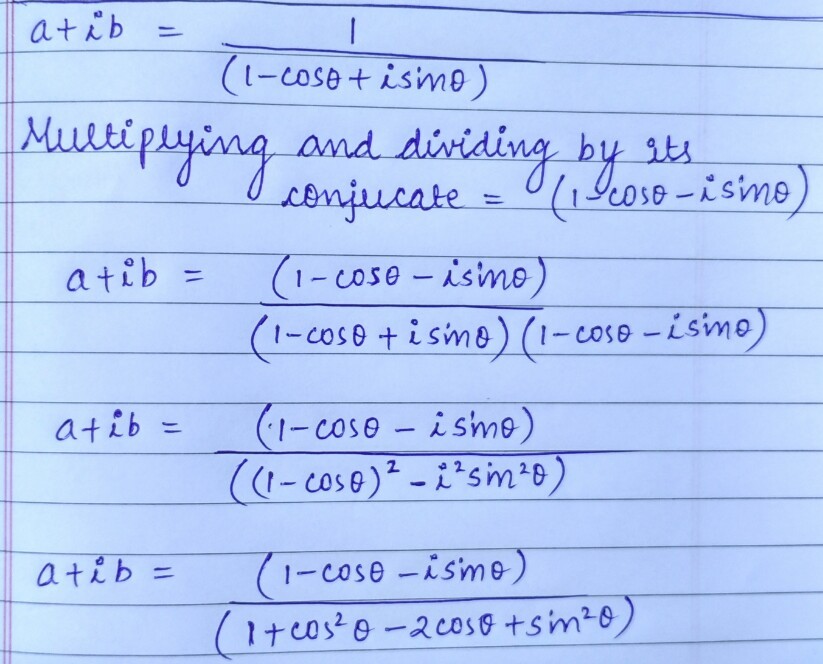100 Followers
Let P = tan 2 θ + 2 tan θ + 4 tan 2 θ + 8 cot 4 θ and given that 1 − cos θ + i sin θ 1 can be expressed in the form of a + b i , where a and b are real numbers with i = − 1 . Compute P a ⋅ b .
The answer is -0.25.
This section requires Javascript.
You are seeing this because something didn't load right. We suggest you, (a) try
refreshing the page, (b) enabling javascript if it is disabled on your browser and,
finally, (c)
loading the
non-javascript version of this page
. We're sorry about the hassle.
3 solutions




That is a wonderful answer,, but i
m sorry because i don
t understand the concept,, may you give more explanation about the concept,, thanks,,
Let x = tan 2 θ . We can use the double-angle formula to get tan ( θ ) = 1 − x 2 2 x . Applying the formula again and simplifying, we get: tan ( 2 θ ) = 1 − 6 x 2 + x 4 4 x ( 1 − x 2 ) . If we apply the formula one more time and take the reciprocal, we get: cot ( 4 θ ) = tan ( 4 θ ) 1 = 8 x ( 1 − x 2 ) ( 1 − 6 x 4 + x 4 ) ( 1 − 6 x 2 + x 4 ) 2 − 1 6 x 2 ( 1 − x 2 ) 2
Therefore, P = x + 1 − x 2 4 x + 1 − 6 x 2 + x 4 1 6 x ( 1 − x 2 ) + x ( 1 − x 2 ) ( 1 − 6 x 4 + x 4 ) ( 1 − 6 x 2 + x 4 ) 2 − 1 6 x 2 ( 1 − x 2 ) 2 After some simplifying, the result is P = x 1 = cot 2 θ .
Now onto the second part of the problem:
1 − cos ( θ ) + i sin ( θ ) 1 = ( 1 − cos ( θ ) ) 2 + sin 2 ( θ ) 1 − cos ( θ ) − i sin ( θ ) = 2 − 2 cos ( θ ) 1 − cos ( θ ) − i sin ( θ ) = 2 1 − 2 − 2 cos ( θ ) sin ( θ ) i
Thus a = 2 1 and b = − 2 − 2 cos ( θ ) sin ( θ ) . Substitute sin ( θ ) = 2 sin 2 θ cos 2 θ and cos ( θ ) = 1 − 2 sin 2 2 θ :
b = − 4 sin 2 2 θ 2 sin 2 θ cos 2 θ = − 2 1 cot 2 θ
Hence, P a ∗ b = 2 1 ∗ ( − 2 1 cot 2 θ ) ÷ cot 2 θ = 4 − 1
Seriously you have done this or it was just to show another method regarding this problem ??
Log in to reply
Yeah, this is how I actually solved it. Your method is a lot simpler but I didn't think of it.
Log in to reply
Your method is a bit complicated but provides a positive thinking "STICKING TO BASICS FIRST" may even also solve the problem. Good work man :) :)
Put theta =60° and get d ans
Really........